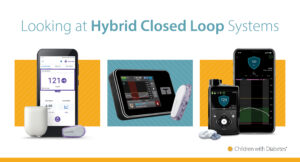Clinical Director
Bumping While Pumping
Let’s talk about it Whether you feel comfortable talking about it or not, sex is a normal part of life. That’s right; we’re talking about sexual intimacy because, as usual, diabetes makes things more complicated. The key to ensuring healthy sexual intimacy with diabetes is honest communication. This can seem intimidating when you are in a newer relationship, but as the saying goes: “Honesty is the best policy.” Blood Sugars and Sex It can be difficult to talk about sex for many people due to the social stigma around sex. But without having conversations about your needs, you could be […]
Read MoreWhen the Parent has Diabetes
Your role as a parent is to teach your children as much as you can to prepare them for their future independence, or something like that. Your kids look to you for answers and guidance to many of life’s challenges. You teach them how to talk, walk, feed themselves, read, show empathy, wash dishes, do algebra, and hundreds of other things in their lifetime. You try to protect them from getting hurt in any way that you can, while knowing you won’t be able to keep them safe from many of life’s typical hardships. When you’re a parent with diabetes, […]
Read MoreCoping with Bullying and T1D
Living with diabetes means that everyday life looks a little different than without diabetes. We need to count the carbohydrates in our meals, check our blood sugar, take insulin. Some of us wear devices that help with diabetes management, and we often have to take care of ourselves a bit more than other folks. Diabetes and Bullying When you’re young, with or without diabetes, there are many pressures to “fit in” and be like everyone else. People with diabetes often feel badly about being different. Furthermore, some people are bullied about their diabetes, which can be really disheartening. According to […]
Read More“Sleigh” your Blood Sugar this Holiday Season
It’s that time of year again! Families will be gathering to share meals, drinks, and laughs for the winter holidays. When you have T1D, you’re likely preparing yourself for the added difficulties of managing blood sugars (and stress levels). Here are our curated tips for sleighing your blood sugar management this holiday season! Go to Gatherings with all your Diabetes Goodies Being prepared is a cornerstone of diabetes management, and when you’re going to be out for long hours with family, ensuring you have all the insulin, test strips, and anything else you may need will allow you to have […]
Read MoreTzield: Delaying Diabetes
There have been some truly groundbreaking advances in diabetes over the past decade. With more accurate continuous glucose monitors, automated insulin delivery systems continue to get closer to the dream of a fully “closed-loop” system. New medications are also available for people with diabetes that help protect kidney and heart health, as well as improve time in range. And now, we have access to a drug that can help delay the onset of type 1 diabetes. How does it work? Teplizumab, or Tzield, is what’s called an immunomodulatory drug. This means that it disrupts the autoimmune process in the body, […]
Read MoreTogether We Can Reduce Diabetes Stigma
There are many common misconceptions about diabetes, which can lead to people feeling stigmatized, or treated in a way that makes them feel “less than” others. As discussed in, Yes, I can eat that: Answering Diabetes Questions, it seems that we as PWD (People with Diabetes) are subjected to more questions about our choices than people without diabetes. Part of the reason that people feel they can ask us these questions is due to the cultural stigmas around diabetes. Diabetes Stigma Defined It’s a popular belief that diabetes is caused by lifestyle behaviors such as lack of exercise or eating […]
Read MoreCOVID Viruses, Vaccines, and T1D
Although we do not know the cause of type 1 diabetes, scientists believe that there is an environmental trigger that kick-starts the autoimmune process. When the body has the added stress of something like a virus, for example, it may cause the body to start attacking itself. For type 1 diabetes, the islet cells are the target of the body’s autoimmune attack. Viruses and Auto Immunity Recent data was presented at the European Association for the Study of Diabetes conference in September 2022 that showed people who had recently been diagnosed with type 1 diabetes were more likely to have […]
Read MoreWhy We Rotate Insulin Injections
Insulin is life for those of us living with T1D and many of those with other types of diabetes. There are many nuances to taking insulin, including the importance of rotating where insulin is injected into the body. When insulin is injected repeatedly in the same part of the body, it can cause changes in the skin that make insulin absorb erratically. Here’s some more information to help you avoid unnecessary challenges with managing blood sugars. Lipodystrophy Anyone who took Latin or medical terminology classes, this will be a little easier for you! For the rest of us, we’ll break […]
Read MoreLooking at Hybrid Closed Loop Systems
Diabetes technologies are changing quickly, so we at CWD want to make sure you have the up-to-date information on what’s available to you in the U.S. For your reference and to help with any decisions you may need to make, we put together this chart of the current hybrid closed-loop systems for people with diabetes, as well as some helpful information about closed-loop systems. Some Quick Definitions: Basal – Background insulin Bolus – insulin taken for food or correcting a higher than target blood glucose CGM – Continuous Glucose Monitor Open Loop – when the pump is operating independently of […]
Read MoreTaking Diabetes Back to School
Kids often say things such as, “I never get to do (insert something that they probably actually get to do all the time)” and may even ask the adults in their life why they are not allowed to do certain things. But if your child has diabetes, and they are being told “no” by someone at school to treating a blood sugar, this is a huge problem. Luckily, there are protections in place in the U.S. to keep children with diabetes safe in schools. The Americans with Disabilities Act of 1990 is a law that helps prevent people with disabilities […]
Read More









